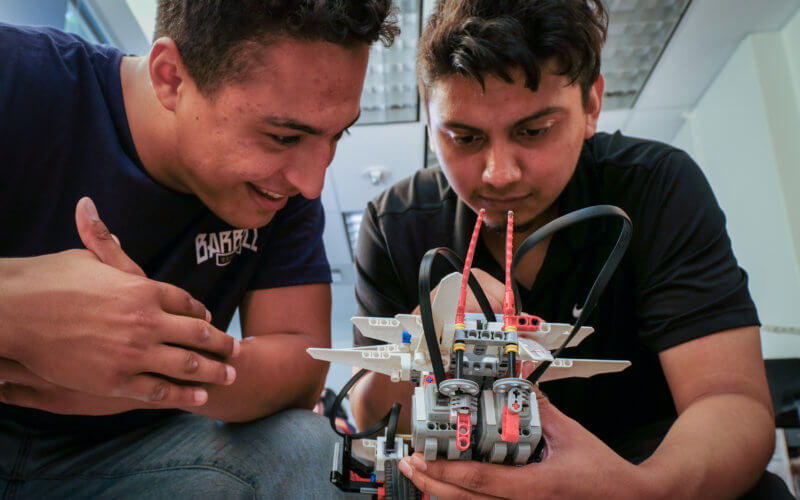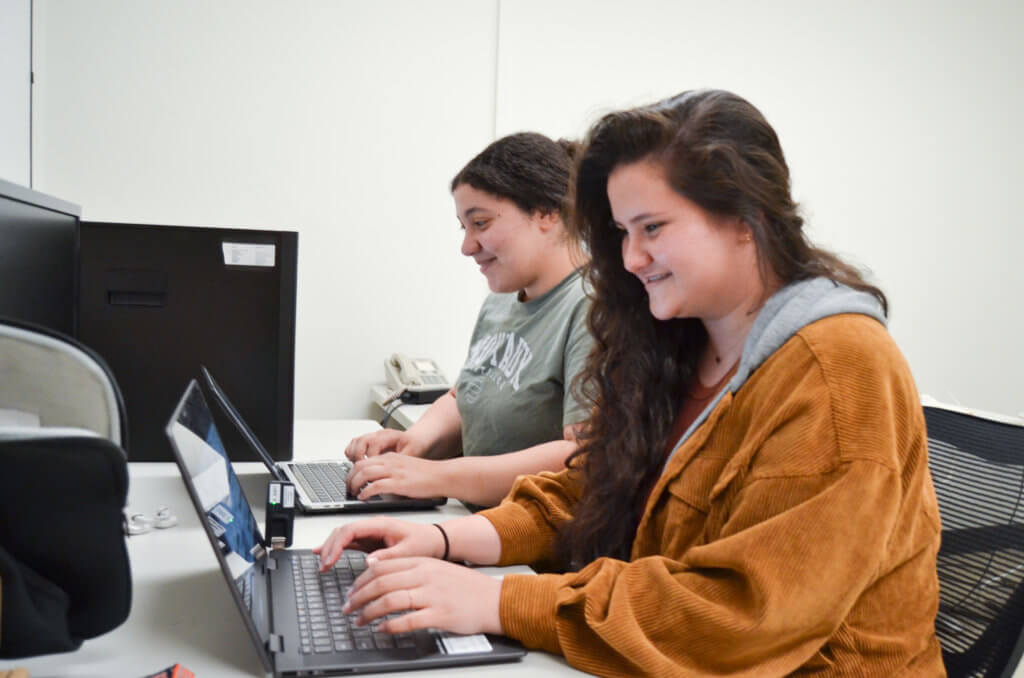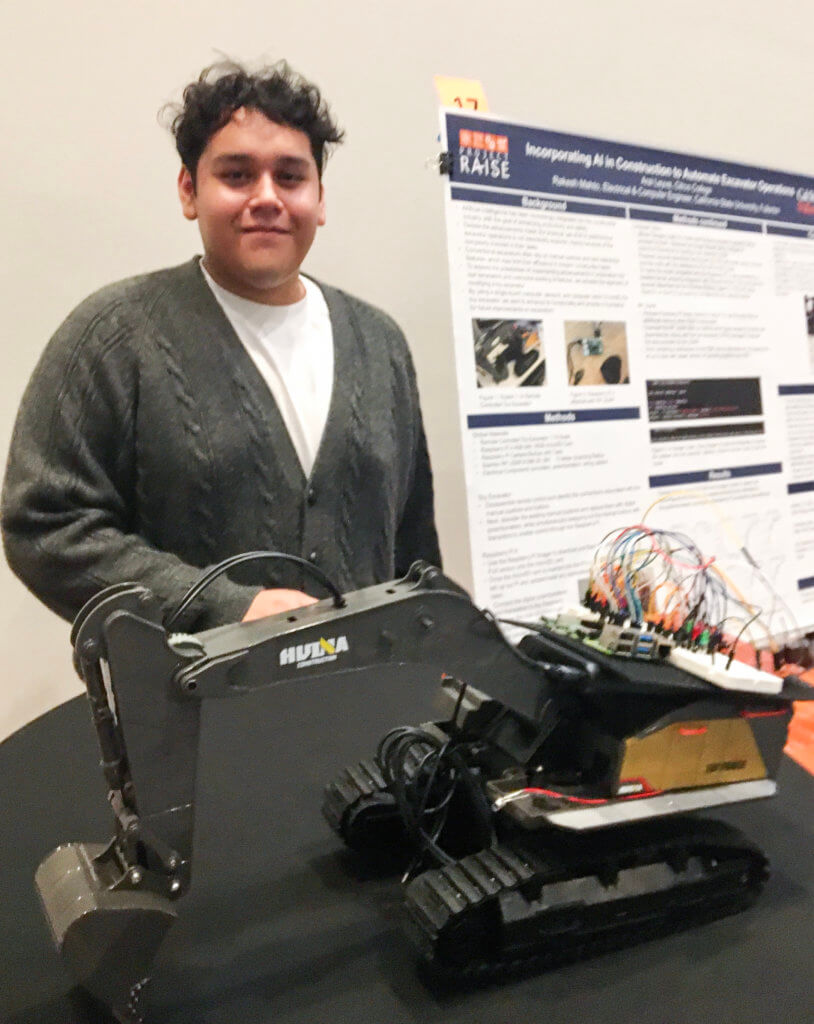
Community college students Saray Angulo and Arai Leyva are participating in their first research activities as part of Cal State Fullerton’s Project RAISE Undergraduate Research Experience.
Both students work alongside faculty mentors on projects to strengthen their research skills as they prepare to transfer to the university in STEM majors this fall.
Thirty-nine students — many Latinx and from underrepresented backgrounds — are participating in the eight-week summer research program, which partners with nine community colleges in the region.
A $5 million U.S. Department of Education grant is funding 36 students in Project RAISE. Three students are participating through a nearly $1.2 million National Science Foundation grant to increase the number of students from underrepresented groups with postbaccalaureate degrees in gravitational-wave astronomy.
Angulo, transferring from Fullerton College and majoring in chemistry, works with Andrew Petit, associate professor of chemistry and biochemistry.
She is exploring the behavior of photobases — molecules that become billions of times more reactive after absorbing light. Angulo uses high-performance computing resources operated by the Center for Computational and Applied Mathematics to perform her research.

“This experience has opened so many doors in my science career,” Angulo said. “I have already learned so much from the faculty, especially certain skills to help me in my future career.”
Photochemistry, or light-driven chemistry, is increasingly used in a variety of industries from plastics to pharmaceuticals, Petit said.
“Our long-term goal is to identify applications of photobases for industrially important reactions. To do this, we first need to understand their light-driven properties and why these properties exist,” said Petit, who received a grant from the American Chemical Society Petroleum Research Fund for this research.
Angulo’s work, along with Petit and his research students, can potentially lead to the discovery of new photobases that could make chemical reactions used in industry more efficient, economical and environmentally friendly.
Leyva, who is transferring from Citrus College as a computer science major and earned an associate degree in the discipline, is conducting research in the lab of Rakesh Mahto, associate professor of electrical and computer engineering. He is building a miniature excavator and using sensors to automate construction machinery.
Excavators are substantial construction machinery applied across expansive industrial work areas, particularly on construction sites.

“We’re upgrading the excavator by adding a small computer, sensors and smart vision technology to improve its functionality,” Leyva said. “We also hope to lay the foundation for future advancements in real excavators with these features.”
About half of this summer’s Project RAISE participants are transferring to CSUF or other four-year universities this fall, with the remainder returning to their community colleges, said Megan Drangstveit, project director.
Citrus, Cypress, Fullerton, Golden West, Irvine Valley, Orange Coast, Saddleback, Santa Ana and Santiago Canyon colleges are partners on the latest grant. Students are matched with faculty mentors in the College of Natural Sciences and Mathematics and the College of Engineering and Computer Science to provide training and support.
“The Undergraduate Research Experience is an amazing opportunity for community college students because it gives them direct experience in a research setting. Students apply classroom knowledge in real labs, learn to be part of a dynamic research team and connect with peers and faculty,” Drangstveit said.
Project RAISE started on campus in 2016 with a five-year, nearly $6 million U.S. Department of Education grant, followed by a new $5 million award for Project RAISER in 2021. The program to date has worked with 262 students from partner community colleges.
Many students who participated in the program have graduated with a four-year degree, and others are now in graduate and professional schools or work in a STEM (science, technology, engineering and mathematics) field, Drangstveit said.
“Undergraduate Research Experience participants have stronger identities as STEM students, higher self-efficacy due to participating in research and go on to do great things,” she added.
As a result of the new five-year grant, the program expanded its activities and is working more closely with partner colleges to improve the transfer student experience, including articulation agreements, resources at the college before transfer and analyzing data on transfer student performance, Drangstveit said.
In Project RAISE, Leyva, an aspiring game developer, is learning about applying new technologies, including artificial intelligence and machine learning, and computational skills.
“My research experience has opened doors to new opportunities and introduced me to an entirely different field I never considered,” he said.
Angulo, who spent five years at community college and earned an associate degree in chemistry, also looks forward to pursuing research opportunities at CSUF, including continuing her work in Petit’s lab in the fall.
“I am glad to be able to transfer to CSUF to push myself into becoming a better student and scientist,” she said.
Angulo and Leyva were among the students who presented their projects at the Aug. 10 CSUF Summer Research Symposium. The 10th annual event featured more than 50 students from Project RAISE and other campus summer research programs.
Applications for the 2024 summer Undergraduate Research Experience will open Nov. 1 for current community college students. For more information, visit the website.